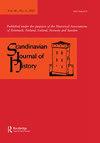叙事与经验:历史学与叙事学之间的跨学科方法论
IF 0.8
3区 历史学
Q1 HISTORY
引用次数: 3
摘要
本导论从叙事学和史学的角度探讨叙事与经验联系的关键因素。语言的转向和叙事的几次转向使叙事学和史学紧密地联系在一起,而在这一发展过程中的一个关键概念是经验。后古典叙事学强调经验性是叙事的核心,史学的新趋势突出了经验在社会文化史中的突出地位。我们考虑如何定位和解释历史叙事,评估叙事学和历史之间的合作,并提出进一步合作的可能方向。鉴于历史学术的语言学转向已经在撰写历史的前提下产生了广泛的理论和哲学讨论,我们的目标是促进近期叙事学方法在历史上的方法论应用,这将有助于回答具体的经验问题。同时,历史研究成为叙事学分析的一个有用的伙伴,为解释特定的叙事提供了对时间和情境语境的必要理解,甚至更多,表明叙事学的解释方案和模式不是普遍的,而是历史构成的。本文章由计算机程序翻译,如有差异,请以英文原文为准。
Narrative and experience: interdisciplinary methodologies between history and narratology
ABSTRACT This introduction discusses key elements in the connections between narrative and experience from the viewpoints of narratology and historical studies. The linguistic turn and the several narrative turns have brought narratology and historiography close together, and a key concept in this development has been experience. Postclassical narratology emphasizes experientiality as the core of narrative, and new trends in historiography foreground the salience of experience in social and cultural history. We consider how historical narratives can be located and interpreted, assess cooperation between narratology and history, and suggest possible lines for further collaboration. Whereas the linguistic turn in historical scholarship has produced extensive theoretical and philosophical discussions on the premises of writing history, we aim to promote a methodological application of recent narratological approaches to history that will help to answer concrete empirical questions. Simultaneously, historical research turns out to be a useful partner for narratological analysis, providing a necessary understanding of time- and situation-bound contexts for interpreting particular narratives and even more, showing that narratological schemes and models of explanations are not universal, but historically constituted.
求助全文
通过发布文献求助,成功后即可免费获取论文全文。
去求助
来源期刊

SCANDINAVIAN JOURNAL OF HISTORY
HISTORY-
CiteScore
1.10
自引率
20.00%
发文量
33
期刊介绍:
Scandinavian Journal of History presents articles on Scandinavian history and review essays surveying themes in recent Scandinavian historical research. It concentrates on perspectives of national historical particularities and important long-term and short-term developments. The editorial policy gives particular priority to Scandinavian topics and to efforts of placing Scandinavian developments into a larger context. Studies explicitly comparing Scandinavian processes and phenomena to those in other parts of the world are therefore regarded as particularly important. In addition to publishing articles and review essays, the journal includes short book reviews. Review essay proposals and polemical communications are welcomed.
 求助内容:
求助内容: 应助结果提醒方式:
应助结果提醒方式:


